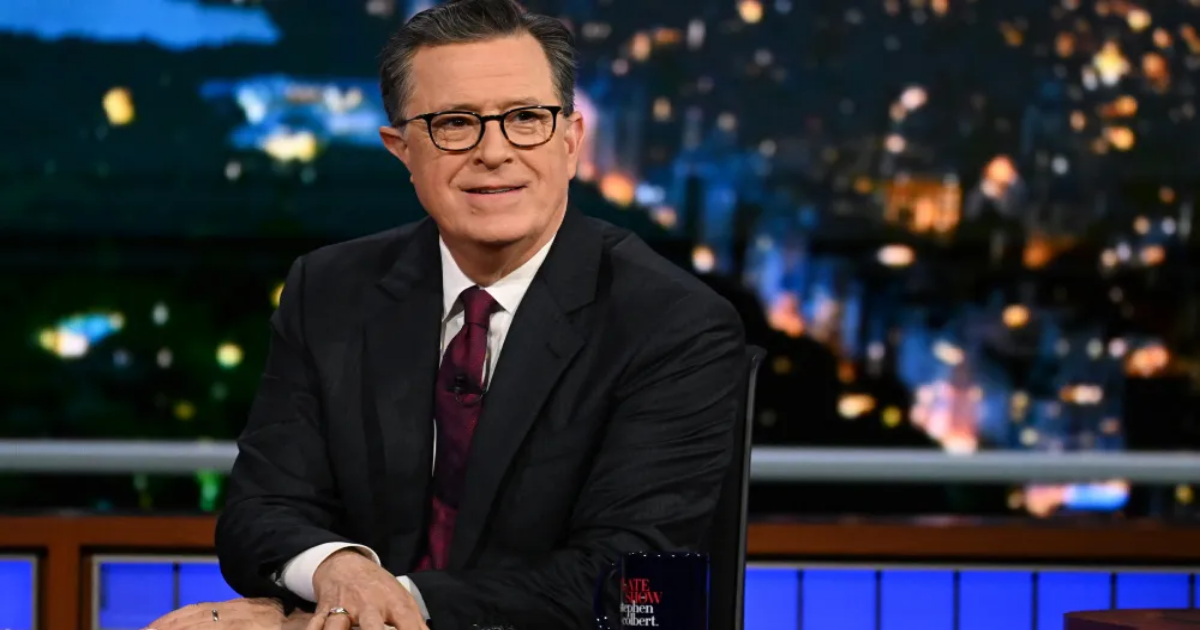TV’s ongoing problems with late night have come for Stephen Colbert, with CBS announcing Thursday that it plans to end his “Late Show” after the next TV season, citing a “financial decision.”
The maneuver — which ends years of original late-night programming at CBS that started when the network lured David Letterman from NBC in 1993 — comes as the economics of wee-hours TV have begun to accelerate, with media companies growing wary of the high price tags involved in producing the shows while the young viewers they try to attract watch more of them via digital video.
“We consider Stephen Colbert irreplaceable and will retire ‘The Late Show’ franchise” in May of 2026, CBS executives said in a statement. “We are proud that Stephen called CBS home. He and the broadcast will be remembered in the pantheon of greats that graced late night television. This is purely a financial decision against a challenging backdrop in late night. It is not related in any way to the show’s performance, content or other matters happening at Paramount.”
Colbert, who was informed of the network’s decision Wednesday evening, according to a person familiar with the matter, told the audience at the taping for Thursday’s broadcast about the matter. “It is a fantastic job. I wish somebody else was getting it,” he quipped, while offering thanks to CBS executives and the 200 or so staffers who work on his program.
Audience members booed. ““Yeah, I share your feelings,” said Colbert. “It’s not just the end of our show, but it’s the end of ‘The Late Show’ on CBS. I’m not being replaced. This is all just going away.”
There has been growing speculation that both Colbert and Jon Stewart, who hosts one broadcast of Comedy Central’s “Daily Show” each week, could be under growing scrutiny from executives at Skydance Media, which is slated to acquire Paramount Global, the parent of both CBS and Comedy Central. David Ellison, who leads Skydance, has projected an image of being intrigued by the politics espoused by President Donald Trump, who Colbert and Stewart routinely skewer in monologues and commentary.
Indeed, Senator Adam Schiff, the California Democrat, took to social media Thursday after taping a “Late Show” broadcast and said: “If Paramount and CBS ended the Late Show for political reasons, the public deserves to know. And deserves better.”
CBS has already been winding down its activity around midnight. The network recently cancelled “After Midnight,” a companion program that aired after “Late Show” and featured comedian Taylor Tomlinson. She decided to leave to focus on her own stand-up, even though CBS had sought a third season of the show.
It’s no secret among staffers and executives associated with late night that the business of the format has been in decline. Young people are the very consumers jumping first to new streaming behaviors that are less tied to watching programs at a specific time and date. Hosts like Jimmy Fallon, Jimmy Kimmel and Colbert continue to generate headlines and digital memes and still build sizable live audiences that the networks– and their distributors and advertisers — covet. But less so, and the ranks of the hosts have narrowed in recent years. So too have episodes of the shows. None of the medium’s regular hosts holds forth on Fridays any longer, with Fallon’s “Tonight” the last to give up the fifth night of the week.
Still, CBS’ decision has puzzled others in the industry. The exit of a popular late-night host is the kind of thing that might be announced during “upfront” meetings with advertisers in May, so as to boost interest in the program for its last year on air. Indeed, Johnny Carson unveiled his decision to leave NBC’s “Tonight Show” at a presentation to advertisers in 1991. David Letterman was celebrated at one of CBS’ regular upfront spectacles at Carnegie Hall, a decision that helped whet appetites for his last few months on “Late Show.”
Some networks with a big hand in the late-night game continue to gain support for their shows. NBC wooed Allstate, T-Mobile and several other big-spending advertisers to bolster the recently completed 50th season of “Saturday Night Live.” The network is trying to do the same thing with a new program featuring “Tonight Show” host Jimmy Fallon called “On Brand” that has him trying to help market popular products.
Colbert will next year wind up a colorful run. When he took over “Late Show” in 2015, he had to navigate a new role. He was no longer the bloviating conservative character he portrayed on Comedy Central. He had to instead find ways to be his authentic self, even though he had not revealed such a persona to the public in the past. His first months were riddled with scrutiny, and comparisons to the “Late Late Show” led by James Corden that reveled in games and skits. But Colbert turned a corner in 2016 when he hosted an Election Night special on Showtime and had to entertain a live New York crowd that stared in disbelief at results showing that Donald Trump would triumph over Hillary Clinton.
Colbert found his footing that night, and decided to lean heavily into pointed humor about current events. His ratings surged and “Late Show” has often been TV’s most-watched late night program.
Is CBS averse to ratings? Or is the money it costs to get them just too dear at a time when streaming video is taking more of traditional TV’s audience away? CBS has opted to fill its now-empty 12:30 a.m. slot with old repeats of a syndicated comedy roundtable from media entrepreneur Byron Allen? What will the network do to replace “The Late Show”?
